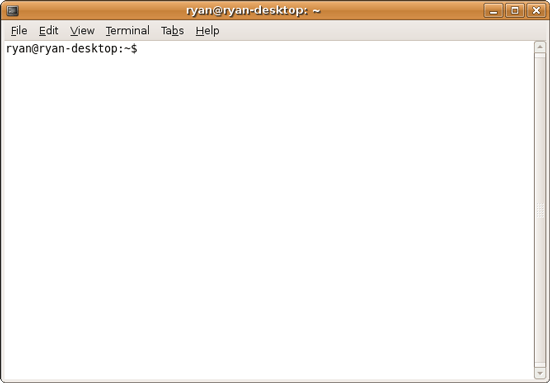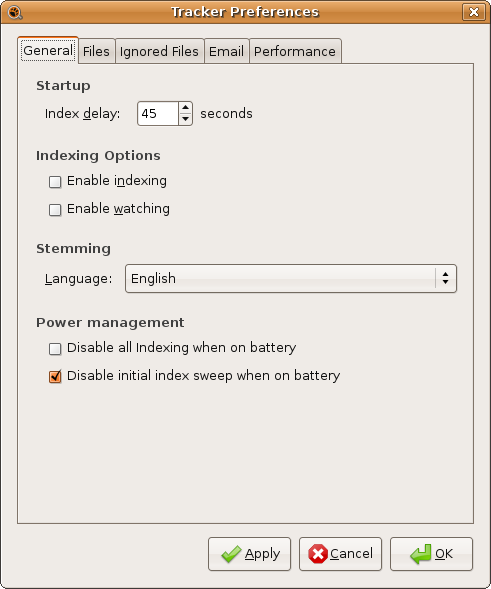Revisiting Linux Part 1: A Look at Ubuntu 8.04
by Ryan Smith on August 26, 2009 12:00 AM EST- Posted in
- Linux
The User Experience
Now that we’ve had a chance to go over the various features of Ubuntu and its included applications, we can get to the burning question: how is it?
In a nutshell, my own experience with Ubuntu has been that it’s capable of meeting 95% of my daily needs, and 75% of my weekly needs. Outside of the lack of the ability to sync my iPhone (which again is Apple’s fault), on any given day I did not need to boot up Windows. However in any given week I would need to boot in to Windows upwards of several times to run various Windows programs that don’t work under Wine or have a doppelganger for Ubuntu, not counting Windows games which also required booting back in to Windows. The result was that there was more dual booting than I would have liked, but it was acceptable.
What worked best for me under Ubuntu were the most common tasks, which makes sense given Ubuntu’s focus. We’ve already hit on how great Firefox is under Ubuntu, but also music playback, email, and word processing worked well. There was never any point where I felt like I could absolutely not accomplish something related to these tasks when using Ubuntu. However with that I will put the disclaimer that I didn’t find Ubuntu to be significantly better at any of these tasks – it was merely good enough.
If this sounds boring, it is. There’s not a lot to be said about otherwise mundane things that work well. Windows and Mac OS X could do these things, and so could Ubuntu. The distinguishing factor here really isn’t functionality; it’s that all of this was free.
In many situations Windows would still offer a better experience than Ubuntu. Sometimes this is a more polished GUI, as it is Ubuntu often looks like an orange version of Mac OS 9 (the bad Mac OS). Other times this would come down to professionally developed programs having an extra feature or two that while not critical, were nice to have. There are numerous little things like these that still keep Ubuntu well-separated from Windows and Mac OS X.

One item where I feel Ubuntu failed in particular is CLI use, which was a condition I outlined earlier. I wasn’t able to avoid using the CLI under Ubuntu, in fact I didn’t even come close. Some of this comes down to the fact that user generated support often uses CLI commands in lieu of instructions for dealing with the GUI, and in other situations such as mounting ISOs and installing video card drivers the situation was completely unavoidable. These are correctable problems.
Along those lines the default configuration of Ubuntu leaves me scratching my head. For example, Ubuntu has a file indexer and search system ala Windows Search and Spotlight. For whatever reason this indexer is not enabled by default and as a result it’s quite easy to miss. By the same token Compiz defaults to not using v-sync, which means windows will tear when moved. This is something hardware accelerated compositing specifically exists to solve. These items, along with finding a way (any way) to install the Microsoft Core Fonts by default so that the font disparity no longer exists would make the initial experience a better one.

The biggest negative influences in the Ubuntu experience were the items we listed under Things That Went Wrong. It’s easy to pick at things that don’t work, but these also happen to be the things that drove me out of Ubuntu for that moment. Meanwhile the biggest positive influences come down to Firefox and Totem. Neither is perfect, but as I discussed in their respective sections they’re great programs that are much better than the default programs found with Windows and Mac OS X.
Overall I found the Ubuntu experience to be decent, but not spectacular. Next to any issues listed out above, there’s a general lack of killer applications. As a result unless you specifically value the fact that it’s free (in either sense of the word) or the security benefits of it not being Windows, then there’s really nothing there that makes Ubuntu compelling compared to Windows or Mac OS X.










195 Comments
View All Comments
ioannis - Wednesday, August 26, 2009 - link
...sorry, I think it's Alt+F2 by default. I'm talking about the 'Run Command' dialog.Eeqmcsq - Wednesday, August 26, 2009 - link
Oh, yes you're right. I stand corrected.sprockkets - Wednesday, August 26, 2009 - link
Ubuntu doesn't ship with the firewall on eh? Weird. SuSE's is on, and that has been the default for quite some time. GUI management of it is easy too.clarkn0va - Wednesday, August 26, 2009 - link
For incoming connections I don't quite grasp what good a firewall will do on a system with no internet-facing services. With no open ports you stand little to gain from adding a firewall, and any internet-facing service you might add, well, you don't want to firewall that anyway.I can see two theoretically plausible arguments for a host-based firewall, but even these don't really stand up in real-world use: 1) a machine that has open ports out of the box (I'm looking at you, Windows), and 2) for the folks who want to police outgoing connections.
In the case of the former, why would we open ports and then block them with a firewall, right out of the box? This makes as much sense to me as MS marketing their own antivirus. Third-party firewalls were rightfully introduced to remedy the silly situation of computers listening on networks where they shouldn't be, but the idea of MS producing a host-based firewall instead of just cleaning up their services profile defies common sense.
In the case of outbound firewalling, I've yet to meet a home user that understood his/her outbound firewall and managed it half-way effectively. Good in theory, usually worse than useless in practice.
db
VaultDweller - Wednesday, August 26, 2009 - link
Just because a port/service is open, doesn't mean you want it open to the whole world.Examples:
SMB
NFS
VNC
RDP
SSH
Web (intranet sites, for example)
And the list could go on... and on and on and on, really.
Also, it's erroneous to assume that only 1st party software will want to open ports.
And that is to say nothing of the possibility of ports being unintentionally opened by rogue software, poorly documented software, naughty admins, or clumsy admins.
Host-based firewalls help with all of these situations.
clarkn0va - Wednesday, August 26, 2009 - link
Windows firewall doesn't filter by source. In other words, if you want SMB or any other service open to some peers and not others, Windows firewall can't help you; you'll need a more sophisticated product or a hardware firewall for that.I'm not saying there's no case for host-based firewalls, I'm just saying it's pointless for most users out of the box, where Ubuntu doesn't need it and Windows should be looking at fixing the problem of unneeded services running, rather than just bolting on another fix.
VaultDweller - Wednesday, August 26, 2009 - link
"I can see two theoretically plausible arguments for a host-based firewall, but even these don't really stand up in real-world use"That sounds to me like a claim that there is little or no case for a host-based firewall; at least, that's how I interpreted it.
"Windows firewall doesn't filter by source. In other words, if you want SMB or any other service open to some peers and not others, Windows firewall can't help you"
That is incorrect, and you should check your facts before making such statements. The Windows Firewall can filter by source. Any firewall exception that is created can be made to apply to all sources, to the local subnet only, or to a custom list of IPs and subnets.
The firewall in Vista and Windows 7 goes a step further, as it is location aware. Different ports and services are opened depending on the network you're plugged into, as exemplified by the default behavior of treating all new networks as "Public" (unknown and untrusted) until instructed otherwise.
clarkn0va - Wednesday, August 26, 2009 - link
"The Windows Firewall can filter by source. Any firewall exception that is created can be made to apply to all sources, to the local subnet only, or to a custom list of IPs and subnets. "In that case I retract my assertion that an out-of-the-box firewall makes no sense in the case of Windows.
As for Ubuntu, or any other desktop OS having no open ports by default, I still see including an enabled firewall by default as superfluous. Meanwhile, firewall GUIs exist for those wishing to add them.
Paazel - Wednesday, August 26, 2009 - link
...not enough pictures. admittedly my interest additionally waned when i read the newest ubuntu isn't be reviewed.philosofool - Wednesday, August 26, 2009 - link
I'm not done with this article, which I'm loving. However, there's a grammatical/spelling quibble that's driving me nuts: "nevertheless" is one world.